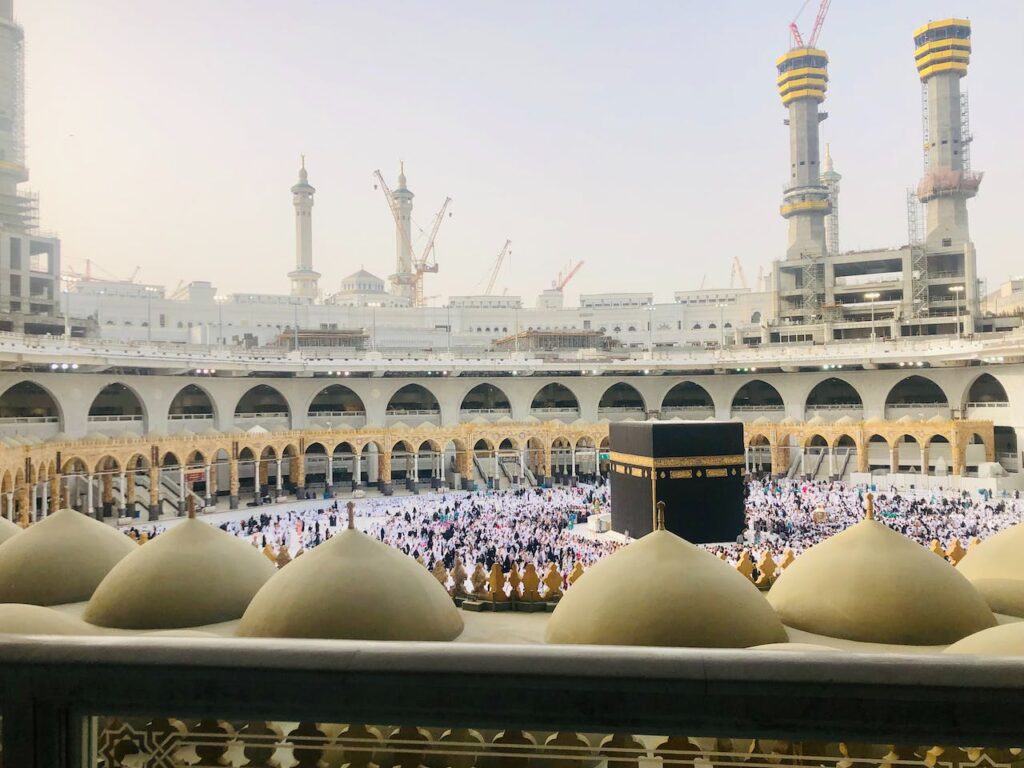In the journey of faith known as Umrah, every step and attire counts. The pilgrimage to the holy city of Mecca, Saudi Arabia, is not just about the physical journey but also the spiritual preparation and adherence to Islamic principles, including dress code. But what not to wear during Umrah, particularly during Tawaf? Let’s explore.
Understanding Umrah and Tawaf
Umrah, often referred to as the ‘lesser pilgrimage,’ is a sacred journey that Muslims undertake, entailing a series of rituals. One of the most significant rituals is Tawaf, the act of circumambulating the Kaaba seven times in a counterclockwise direction. This ritual is imbued with profound spiritual significance, as detailed in Rituals of Tawaf: All You Need to Know.
What Not to Wear During Umrah?
Modesty is a fundamental principle in Islam, and it extends to the attire worn during the Umrah pilgrimage. Here’s what to avoid:
- Tight, Transparent, and Flashy Clothes: Outfits should not reveal the shape of the body, be see-through, or attract attention with bold colors or patterns.
- Non-Islamic Symbols: Clothes depicting pop culture, offensive images, or non-Islamic religious symbols should be avoided.
Attire Rules During Tawaf
During Tawaf, men wear two pieces of unstitched white cloth known as Ihram, while women can wear any modest dress and headscarf but should avoid covering their faces and hands. It’s also important to note that touching Kaaba during Tawaf is not necessary; you can learn more about it in Can You Touch Kaaba During Tawaf?.
Prohibited Acts During Umrah
While in the state of Ihram during Umrah, there are certain acts that are prohibited in order to maintain the sanctity and purity of the pilgrimage. These acts should be avoided to ensure that your journey is in accordance with the teachings of Islam. Here are some of the prohibited acts while in Ihram:
- Trimming or cutting hair: During the state of Ihram, it is forbidden to trim or cut your hair. This includes shaving, cutting, or even plucking a single strand of hair. The hair should be left untouched until the completion of the pilgrimage.
- Clipping nails: Similarly, clipping or cutting your nails is also prohibited while in Ihram. This applies to nails on both the hands and feet.
- Using perfumes or scented products: The use of perfumes, scented oils, or any other fragrant products is not allowed while in Ihram. This is to maintain a state of simplicity and purity.
- Hunting: Hunting or killing animals while in the state of Ihram is strictly prohibited. The preservation of wildlife and the sanctity of the pilgrimage takes precedence over any hunting activities.
- Engaging in sexual activity: Sexual intimacy or any kind of sexual activity is not permissible while in Ihram. This includes both physical acts and any kind of explicit or inappropriate behavior.
- Causing harm to others: It is essential to be mindful of your actions and avoid causing harm or distress to others. This includes physical harm, verbal abuse, or any form of harassment.
FAQs
- Can I read Quran during Tawaf? Yes, you can. For further clarification, refer to Can You Read Quran During Tawaf?
- Can you wear shoes during Tawaf? The answer is yes. For more details, read Can You Wear Shoes During Tawaf?
- What are the different types of Tawaf? There are several types of Tawaf, each with its unique significance. Learn more at What are the Different Types of Tawaf?
- How long does it take to finish Tawaf? The duration of Tawaf can vary. For more details, refer to Tawaf Distance: How Long Does it Take to Finish Tawaf?
Conclusion
In conclusion, Guided by the principles of modesty and respect, the attire you choose for Umrah can enhance your spiritual journey. Remember, the goal is not just to perform the rituals but to absorb the profound spiritual experience that Umrah offers. May your journey be blessed and enlightening.






